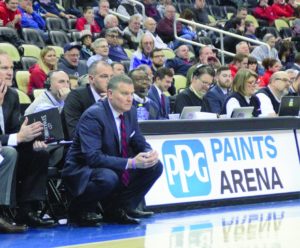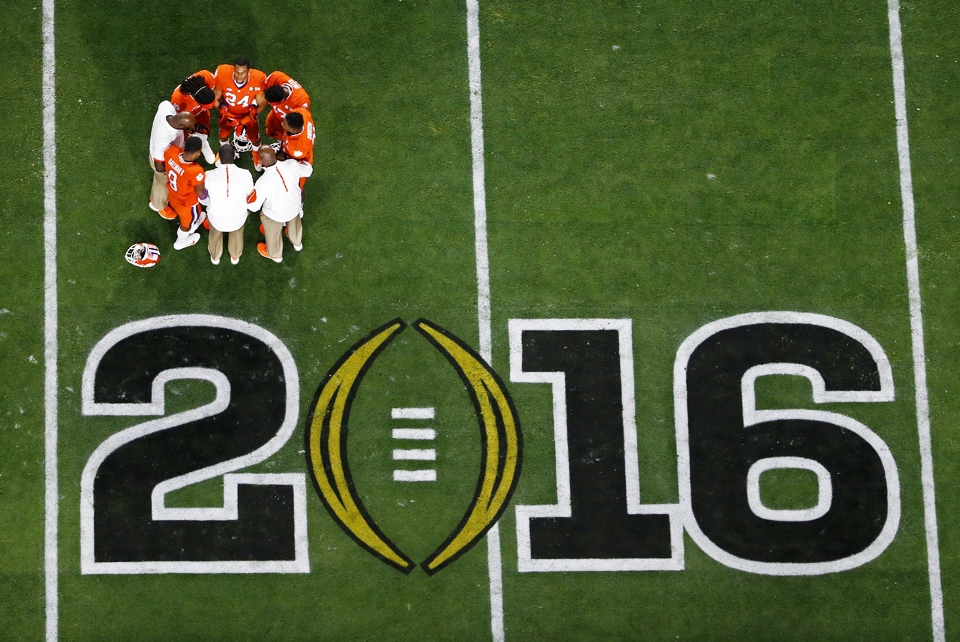

Head coach Jim Ferry looks on as his team struggles in a 76-57 loss to the University of Dayton Flyers at PPG Paints Arena on January 14. The loss pushed the Red & Blue to 9-9 on the season.
By Andrew Holman | Sports Editor
In an incredibly sloppy affair for both sides, Duquesne suffered a brutal 19-point loss to the University of Dayton at PPG Paints Arena on Saturday afternoon.
Following a 3-pointer by graduate student and guard Emile Blackman with 15:49 left to go in the second half, the Dukes trailed by just six to the defending Atlantic 10 regular season champion Flyers.
But the last 15:49 didn’t show a team passionate about making a comeback to secure a marquee win. It didn’t have the feeling of a team inspired by a poor first-half performance. What the last 15:49 really showed was a young team that lacked an identity.
Sure, the season-high 22 turnovers were a problem — a big one. Agreed, the 66.7 percent from the charity stripe is also a place for concern. But the biggest concern of all really seems to be a lack of identity within the Duquesne men’s basketball program.
Why Duquesne? What’s the recipe for success? How does head coach Jim Ferry and his coaching staff brand this program to recruits or players? It seems he wants defense to be the foundation for his success, but the players that are brought into the program don’t really share that same defensive intensity.
That lack of enthusiasm was exposed on Saturday when the Red & Blue came out with little to no emotion and therefore found themselves down 21-6 with about eight minutes gone in the first half. The biggest problem defensively is how slowly the Dukes were moving to the ball. Dayton had a plethora of wide open shots all night long due to late closeouts and and lackluster transition defense.
The Flyers scored 27 points off turnovers and 19 points off the fast break. Those numbers don’t resemble a team whose identity resides on the defensive end of the court.
Guys go play for Mike Krzyzewski at Duke University, and Roy Williams at the University of North Carolina, to be a part of the rich basketball history that each of those schools bestow. Players go to Syracuse University because they fit inside the trademark 2-3 defense that Jim Boeheim preaches.
Even in the Atlantic 10 just a few years ago, recruits were lining up to play for Shaka Smart at Virginia Commonwealth University to be a part of the “Havoc” defense that flustered opponents. Smart built up a brand and an identity for VCU basketball and along with it came success and a spot in the Final Four. But, he only found that success because the players that he brought into the program bought into the system.
That’s what creating a winning culture and a winning program is all about. Duquesne basketball has no true identity to recruit, live and play by and it could be a big reason the men’s program hasn’t reached the NCAA tournament since 1977.
On the women’s side, head coach Dan Burt has been able to create a winning culture and it has already resulted in an NCAA tournament berth followed by the program’s first NCAA tournament win over Seton Hall just last year. He does this by recruiting the right type of players to play within his system.
Ferry has done some impressive things with the young roster in place this season, most notably beating arch-rival Pittsburgh, but with a fresh start and a new team this year he needs to use it as a chance to re-brand Duquesne basketball. He needs to figure out what he wants the identity of his program to be and it needs to be ingrained in his players.
After back-to-back losses to Dayton and most recently George Washington that pushed the Dukes to below the .500 mark, Duquesne is in a critical point of their season.
The quartet of Mike Lewis II, Tarin Smith, Isiaha Mike and Nakye Sanders — all of whom are freshman and sophomores — provides hope for a bright future. It’s time to capitalize on the promising youth and start building an identity that can provide and maintain success for Ferry’s program.
Ferry accomplished that during his time at Long Island and coached them to a pair of March Madness appearances in his final two seasons there. Now it’s time to duplicate that effort at Duquesne in order to get the program back to being a contender within the conference and on the national stage.



